中学英语重点词汇和句型用法讲解
人教版丨九年级上册英语2单元短语 句型 词汇与句式精讲
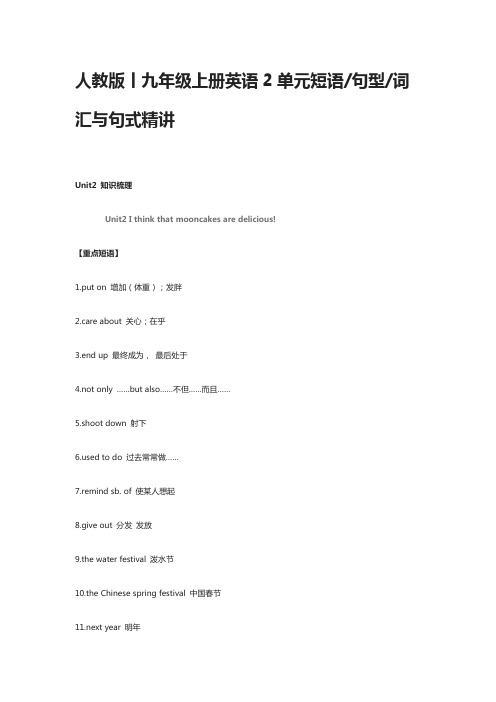
人教版丨九年级上册英语2单元短语/句型/词汇与句式精讲Unit2 知识梳理Unit2 I think that mooncakes are delicious!【重点短语】1.put on 增加(体重);发胖2.care about 关心;在乎3.end up 最终成为,最后处于4.not only ……but also……不但……而且……5.shoot down 射下ed to do 过去常常做……7.remind sb. of 使某人想起8.give out 分发发放9.the water festival 泼水节10.the Chinese spring festival 中国春节11.next year 明年12.sound like 听起来像13.each other 互相彼此14.in the shape of 以……的形状15.on mid-autumn night 在中秋之夜16.fly up to 飞向y out 摆开布置e back 回来19.as a result 结果因此20.Mother’s day 母亲节21.more and more popular 越来越受欢迎22.think of 想起;认为;思考23.dress up 装扮穿上盛装24.the importance of ……的重要性25.make money 挣钱26.in need 需要帮助处于困境中27.between …and…在……和……之间28.the dragon boat festival 龙舟节29.the lantern festival 元宵节30.like best 最喜欢31.go to …for a vacation 去……度假32.be similar to 与……相似33.wash away 冲走洗掉34.Mid-autumn festival 中秋节35.shoot down 射下36.call out 大声呼喊37.the tradition of ……的传统38.at night 在夜里; 在晚上39.one…,the other…一个……,另一个…...40.Father’s day 父亲节【重点句型】1. I think that they’re fun to watch.我认为它们看着很有意思。
仁爱版初一英语下册重点词语句型语法1
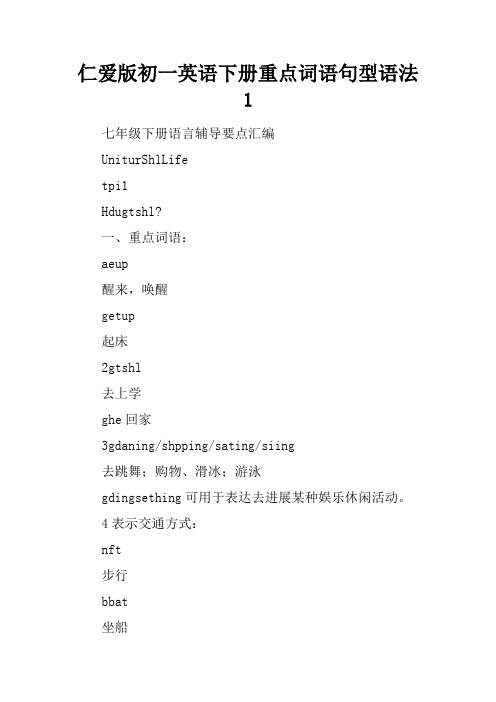
仁爱版初一英语下册重点词语句型语法1七年级下册语言辅导要点汇编UniturShlLifetpi1Hdugtshl?一、重点词语:aeup醒来,唤醒getup起床2gtshl去上学ghe回家3gdaning/shpping/sating/siing去跳舞;购物、滑冰;游泳gdingsething可用于表达去进展某种娱乐休闲活动。
4表示交通方式:nft步行bbat坐船bship坐船bair乘飞机bplane乘飞机btrain坐火车bsuba搭乘地铁bar坐小汽车bbus坐公共汽车bbie骑自行车taethesuba/bus/ar搭乘地铁;公共汽车;小汽车6driveaartr=gtrbar驾车去上班taeabustr=gtrbbus乘公共汽车去上班gtshlnft=altshl步行去上学7rideabie/hrse骑自行车;骑马8aftershl/lass放学以后;下以后9plathepian/guitar/vilin弹钢琴;吉他;小提琴plabasetball/ser/ftball 打篮球;踢足球;打橄榄球plaputergaes玩电脑游戏plaithaputer玩电脑plasprts做运动0nextt紧挨着,在…旁边1aplanfshl一幅我们学校的平面图2needas在工作日ateeends在周末3havebreafast/lunh/supper/dinner/eals 吃早餐;中餐;晚餐;正餐;一日三餐havelasses/lessns/aeeting上;上;开会4athTV/vies/gaes/theanials看电视;电影;比赛;动物readnvels/nespapers/bs看小说;报纸;书ashne’sfae/lthes洗脸;衣服6反义词:up–dn,earl–late近义词:quil–fastgetupearl早起belatefr迟到7thefirst/send/third/furthda第一;二;三;四天8leanthehuse清扫房子9表示建筑物〔尤其学校建筑物〕:ntheplagrund在操场atshl/he/table在学校;家里;桌旁inaputerr/teahers’ffie/lassrbuilding/g/librar/lab/anteen在电脑室;老师办公室;教学楼;体操馆;图书馆;实验室;食堂20arundsix’l=atabutsix’l大约在六点21频率副词:never,seld,seties,ften,usuall,alas二、重点句型:It’stietgetup该起床的时候了。
中考英语重点词汇用法:字母开头j

J1. job /dʒɒb/【词义】n 工作;职业He lost his job.他失业了。
You should do your job as a student.你应该做你学生该做的事。
【短语】do a good job 干得好You did a good job.你做的不错。
【句型】It is one’s job to do sth做某事是某人的工作/事情It’s a doctor’s job to help the sick people.救助病人是医生该做的事情。
该句型中的job还可以换成duty,可以表达类似的意思,意为“做某事是某人的职责”。
如:Lei Feng felt it (is) his duty to help others.雷锋觉得帮助别人是他的职责。
【辨析】job workjob指具体的职业,侧重种类,是可数名词;而work指人们日常生活和工作中从事的体力或脑力劳动,是不可数名词。
可以这样理解:你得先找到job(职业或工作),然后你才有work(活儿或工作)做。
如:He changed several jobs.他换了几个工作。
I have a lot of work to do today.我今天有许多工作要做。
【总结】表示职业的名词:中文英文中文英文演员actor 护士nurse女演员actress 警官officer艺术家artist 钢琴家pianist银行家banker 飞行员pilot老板;上司boss 警察police教练coach 邮递员postman牙医dentist 总统president导演;主任director 首相;大臣prime minister主持人DJ 小学生pupil医生doctor 王后;女王queen司机driver 记者reporter 工程师engineer 科学家scientist 农场主farmer 歌唱家singer渔夫fisherman 学生student导游guide 教师teacher 饲养员;保管人keeper 商人trader 国王;君主king 小提琴手violinist 经理manager 工人worker魔术师magician 作家writer(1) DJ指的是“流行音乐节目主持人”。
人教版丨八年级下册英语第7单元单词,重点句型,词汇讲解

人教版丨八年级下册英语第7单元单词/重点句型/词汇讲解Unit 7单词(音标)square 平方;正方形meter 米;公尺deep 深的;纵深的desert 沙漠population 人口;人口数量Asia 亚洲feel free (可以)随便(做某事)tour 旅行;旅游tourist 旅行者;观光者Wall 墙amazing 令人大为惊奇的;令人惊喜(或惊叹)的ancient 古代的;古老的protect 保护;防护wide 宽的;宽阔的as far as l know 就我所知achievement 成就;成绩southwestern 西南的;西南方向的thick 厚的;浓的include 包括;包含freezing 极冷的;冰冻的condition 条件;状况take in 吸入;吞入(体内)succeed 实现目标;成功challenge 挑战;考验in the face of 面对(问题、困难等)achieve 达到;完成;成功force 力;力量nature 自然界;大自然even though 即使;虽然ocean 大海;海洋the Pacific Ocean 太平洋centimeter 厘米weigh 重量是……;称……的重量birth 出生;诞生at birth 出生时up to 到达(某数量、程度等);至多有;不多于adult 成年的;成人的;成人;成年动物bamboo 竹子endangered 濒危的research 研究;调查(用作名词时,重音可放在第一个音节)keeper 饲养员;保管人awake 醒着excitement 激动;兴奋walk into 走路时撞着fall over 绊倒illness 疾病;病remaining 遗留的;剩余的or so 大约artwork 图片;插图wild 野生的government 政府;内阁whale 鲸oil 油;食用油;石油protection 保护;保卫huge 巨大的;极多的Tenzing Norgay 丹增诺尔盖Edmund Hillary 埃德蒙希拉里Junko Tabei 田部井淳子Qomolangma 珠穆朗玛峰the Nile 尼罗河the Caspian Sea 里海(世界最大的咸水湖)the Sahara 撒哈拉沙漠the Yangtze River 长江the Yellow River 黄河the Ming Dynasty 明朝the Ming Great Wall 明长城the Himalayas 喜马拉雅山脉the Amazon River 亚马逊河[05:09.98]Chengdu Research Base 成都研究基地Unit7 知识梳理【重点短语】1. as big as 与……一样大2. one of the oldest countries 最古老的国家之一3. feel free to do sth. 随意地做某事4. as far as I know 据我所知5. man-made objects 人造物体6. part of... ...... 的组成部分7. the highest mountain 最高的山脉8. in the world 在世界上9. any other mountain 其它任何一座山10. of all the salt lakes 在所有的咸水湖中11. run along 跨越……12. freezing weather 冰冻的天气13. take in air 呼吸空气14. the first people to do sth. 第一个做某事的人15. in the face of difficulties 面临危险16. give up doing sth. 放弃做某事17. achieve one’s dream 实现某人的梦想18. the forces of nature 自然界的力量19. reach the top 到达顶峰20. even though 虽然;尽管21. at birth 在出生的时候22. be awake 醒着23. run over with excitement 兴奋地跑过去24. walk into sb. 撞到某人25. fall over 摔倒26. take care of 照顾;照料27. every two years 每两年28. cut down the forests 砍伐林木29. endangered animals 濒危动物30. fewer and fewer pandas 大熊猫越来越少31. be in danger 处于危险之中32. the importance of saving these animals 拯救这些动物的重要性【重点句型】1.It is also very hard to take in air as you get near the top. 当你接近山顶时,连呼吸都会困难。
人教版七年级英语下册Unit11课文+单词+知识梳理+词汇讲解+句型解析

人教版七年级英语下册Unit11课文+单词+朗读+知识梳理+词汇讲解+句型解析milk [mɪlk] v. 挤奶cow [kaʊ] n. 奶牛,母牛;母兽milk a cow给奶牛挤奶horse [hɔː(r)s] n. 马ride a horse骑马feed [fiːd] v.(fed/fed)喂养;饲养feed chickens喂鸡farmer ['fɑː(r)mə(r)] n.农民;农场主quite [kwaɪt] adv.相当;完全quitea lot(of…)许多anything ['enɪθɪŋ](常用于否定句或疑问句)任何东西;任何事物grow [grəʊ] v.种植;生长;发育farm [fɑː(r)m] n.农场 v.务农pick [pɪk] v.采;摘excellent ['eksələnt] adj.countryside ['kʌntrɪsaɪd].乡村;农村inthe countryside在乡下;在农村yesterday ['jestə(r)dei] adv.昨天flower ['flaʊə(r)] n.花worry ['wʌri] v.&n.担心;担忧luckily ['lʌkɪli] adv.幸运的;好运的sun [sʌn] n.太阳museum [mjuː'ziəm] n.博物馆fire ['faɪə(r)] n.火;火灾frie station ['steɪʃ(ə)n]消防站painting ['peɪntɪŋ] n.油画;绘画exciting [ɪk'saɪtɪŋ] adj.使人兴奋的;令人激动的lovely ['lʌvli] adj.可爱的expensive [ɪk'spensɪv] adj.昂贵的cheap [tʃiːp] adj.廉价的;便宜的slow [sləʊ] adj.缓慢的;迟缓的fast [fɑːst] adv.&adj. 快地(的)robot ['rəʊbɒt] n.机器人guide [gaɪd] n.导游;向导gift [gɪft] n.礼物;赠品all in all总的来说everything ['evrɪθɪŋ] pron.所有事物;一切interested ['ɪntrəɪstɪd] adj.感兴趣的be interested in… 对……感兴趣dark [dɑː(r)k] adj.黑暗的;昏暗的hear [hɪə] v.(heard/hɝ:(r)d)听到;听见Carol ['kærəl]卡罗尔(女名)【重点短语】1. school trip 学校旅行2. go for a walk 去散步3. milk a cow 挤牛奶4. ride a horse 骑马5. feed chickens 喂鸡6. talk with a farmer 与农民交谈7. take some photos 照相8. ask some questions 问一些问题9. grow apples 种苹果10. show sb. around sp. 带某人逛某地11. learn a lot 学到许多12. pick some strawberries 摘草莓13. last week 上周14.In the countryside 在乡村15. visit my grandparents 拜访我的祖父母16. go fishing 去钓鱼17. sound good 听起来很好18. climb the mountains 去爬山19. play some games 玩一些游戏20. visit a museum 参观博物馆21. visit a fire station 参观消防站22.draw pictures 画画23. go on a school trip 去旅行24 visit the science museum 参观科技博物馆25. how to make a model robot 如何制作机器人模型26. gift shop 礼品店27. buy sth. for sb. =buy sb. sth.为某人买某物28. all in all 总得来说29. be interested in... 对…感兴趣30. be expensive 昂贵的31. not...at all 一点儿也不【重点句型】1.---Did you see any cows? 你见到奶牛了吗---Yes, I did. I saw quite a lot. 我见到了而且见到了很多很多2. ---Did Carol take any photos? 罗尔拍照片了吗?---Yes, she did.是的,她拍了。
中学英语重要词汇和句型用法

中学英语重要词汇和句型⽤法中学英语重要词汇和句型⽤法1. 提建议的句⼦:①What/ how about +doing sth.?如:What/ How about going shopping?②Why don’t you + do sth.? 如:Why don’t you go shopping?③Why not + do sth. ? 如:Why not go shopping?④Let’s + do sth. 如: Let’s go shopping⑤Shall we/ I + do sth.? 如:Shall we/ I go shopping?2. first of all ⾸先. to begin with ⼀开始later on 后来、随3. also 也、⽽且(⽤于肯定句)常在句⼦的中间either 也(⽤于否定句)常在句末too 也 (⽤于肯定句) 常在句末4. see sb. / sth. doing 看见某⼈正在做某事 强调正在发⽣see sb. / sth. do 看见某⼈做了或经常做某事 如:如: She saw him drawing a picture in the classroom.她看见他正在教室⾥画画。
5. too many 许多 修饰可数名词 如:too many girlstoo much 许多 修饰不可数名词 如:too much milkmuch too 太 修饰形容词 如:much too beautiful6. used to do sth. 过去常常做某事 否定形式: didn’t use to do sth.used not to do sth.如:He used to play football after school. 放学后他过去常常踢⾜球。
Did he use to play football? Yes, I did. No, I didn’t.He didn’t use to smoke. 他过去不吸烟。
Unit8全面知识点总结(词汇、短语、句型、语法、习作) 2020-2021学年人教版八年级英语下册

Unit8知识点全面总结(词汇到作文)2020-2021学年人教版八年级英语下册(词汇、短语、句型、语法、习作)一.课本词汇和用法1.full of 满是...的,大量...be full of 意为“充满/装满……”。
Oliver Twist is about a boy who goes2.out to sea(1)and finds an island full of treasures.Be full of 表示状态,意为“充满...的”full是形容词。
该(2)短语相(3)当于be filled with,意为“以...填充”,是一个被动语态,fill是动词。
例如:I always believe the world is full of love.= I always believe the world is filled with love. 我总是相信世界充满了爱。
full还有“饱的。
饱满的”,其反义词为hungry 饥饿的3.treasure [ˈtreʒər] n. 财富(不可数名词);珠宝,珍藏品(可数名词)例如:They went there to look for treasure. 他们去那里寻宝。
That island is full of treasures. 那座岛上都是珠宝。
4.Island [ˈaɪlənd] n. 岛,岛屿An island 一座岛5.Classic [ˈklæsɪk] n. 经典作品;名著(可数名词)Classical adj. 经典的;古典的;传统的例如:I like classical music. 我喜欢古典音乐。
6.page [peɪdʒ] n. (书刊或纸张的)页,面,张表示多少页用“数字+page(s)”表示在第几页时用“on page +数字”(无论数字是多少,page 都用单数)例如:100 pages 100页On page 56 在第56页7.hurry [ˈhɜːri] v. 匆忙,赶快hurry up 赶快,急忙Come on!或Be quick!hurry to + 地点名词,意为“匆忙去某地”。
人教版八年级英语Unit3重点短语归纳与句型整理,初二上册英语Unit3英语重要词汇归纳讲解及例句

人教版英语八年级上册Units单词音频+课文音频+知识梳理Unrt3单词outgoing['avtgsuiij]adj.夕卜向的better['beto(r)]adj.&adv.(good和well的比较级)较好的(地);更好的(地) loudly flaudli]adv.喧闹地;大声地;响亮地quietly['kwaiotli]adv.轻声地;轻柔t也;安静地hard-working[ha(r)d'w3:kig]adj.工作努力的;辛勤的competition[kompo'tTfn],[ ka:mpa'tijn]n.tLS:竞争fantastic[faen't壬stik]adj.极好的;了不起的which[witj]pron.&adj.哪一个;哪一些clearly rkliali],fklirli]adv.清楚地;清晰地;明白的win[win]v.获胜;嬴;赢得though[S qu]adv.不过;可是;然而conj.虽然;尽管;不过talented['t^lsntid]adj,有才能的;有才干的truly[*tru:lij adv.真正;确实care[kea],[ker]v,在意;担忧;关心care about关心;&Wserious['srarias],fsirias]adj.严肃的;稳重的mirror['mira(r)]n.镜子kid[kid]n.小孩;年轻人as long as只要;既然necessary pnesasari],["nesaseri]adj.必耍的;必要的be different from与..不同;与有差异both[bsuO]adj.&pron.两个;两个都bring out使显现;使表现出grade[greid]n.成绩等级;评分等级should[fud],[fad]modal v.应该;应当;可以the same as和••…•相同;与……一致saying Pseno]n.谚语;格言;曾句reach[ri:t/]v.伸手;到达;抵达hand[haend]n.手touch[tAtJ]V.感动;触摸heart[ha(r)t]n.内心;心脏fact[fee kt]n.现实;事实in fact确切地说;事实上;实际上break[breik]v.(broke[brouk])(使)破;裂;碎;损坏arm[a:m)n.手臂;上肢laugh[la:f],[\xf]v.笑;发笑n.笑声share[fe»],[fer]v.分享,共享;共用;分摊loud[laud]adj,响亮的;大声的similar fsimsl^r)]adj.相像的;类似的be similar to与•…相像的;与……蜩以的primary「praimwi],[,prarmeri|adj.最初的,最早的primary school<J尊information[infg(r)'meijn]n.信息;消息Tara['tcc:rej r["t«r9]塔拉(女名)Sam[seem]萨姆(男名)Nelly['neli]内莉(女名)Larry[l^ri]拉里(男名)Unit3知识梳理[重点短语]1.more outgoing更外向/更开朗2.as…as..与...一样3.the singing competition歌哧比赛4.the most important>■要的5.be talented in music在音乐方面有天械6.the same as与……相同7.care about关心/留意/关注8.be different from与..…不同9.be like a mirror像一面镜子10.as long as只要;与..….—样长11.bring out显示/显出12.get better grades取得更好的13.reach for伸手达到/达到14.touch one"s heart感动15.in fact事实上16.make friends交朋友17.be good at在某方面成绩好18.the other另一个19.be similar to与...相似20.be good with与…和睦相处【重点句型】1.Sam has longer hair than Tom.=Sam's hair is longer than Tom's.Sam的头发比Tom的长,2. T m taller now than I was2years ago=I was shorter2years ago than I am now.现在的我比两年前更高,3.I study harder now than I did2years ago.现在的我比两年前学习更努力了。
Starter Unit 3重要知识点讲解2021-2022学年人教版七年级英语上册
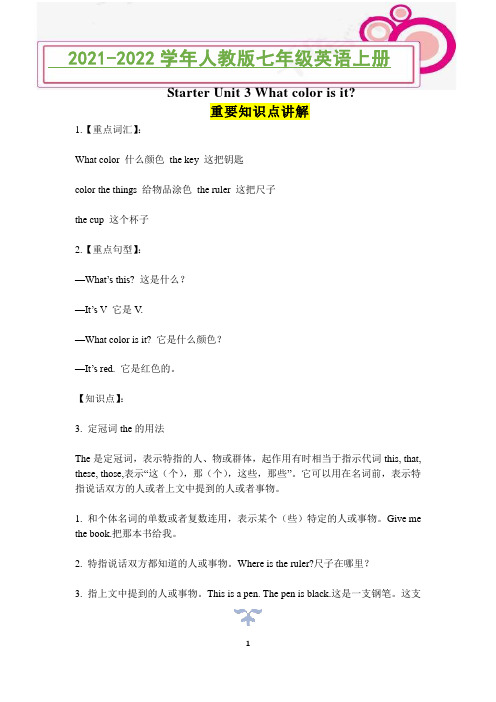
Starter Unit 3 What color is it?重要知识点讲解1.【重点词汇】:What color 什么颜色the key 这把钥匙color the things 给物品涂色the ruler 这把尺子the cup 这个杯子2.【重点句型】:—What’s this? 这是什么?—It’s V 它是V.—What color is it? 它是什么颜色?—It’s red. 它是红色的。
【知识点】:3. 定冠词the的用法The是定冠词,表示特指的人、物或群体,起作用有时相当于指示代词this, that, these, those,表示“这(个),那(个),这些,那些”。
它可以用在名词前,表示特指说话双方的人或者上文中提到的人或者事物。
1. 和个体名词的单数或者复数连用,表示某个(些)特定的人或事物。
Give me the book.把那本书给我。
2. 特指说话双方都知道的人或事物。
Where is the ruler?尺子在哪里?3. 指上文中提到的人或事物。
This is a pen. The pen is black.这是一支钢笔。
这支钢笔是黑色的。
4. 用在世界上独一无二的事物前。
the sun 太阳the earth 地球the moon 月亮the world 世界5. 和某些形容词连用,表示一类人。
the old 老人the young 年轻人the poor 穷人6. 用在方位名词前。
The east 东方the west 西方7. 与play连用时,用在西洋乐器名词前。
Play the piano弹钢琴8. 与专有名词连用。
The Great Wall 长城The Summer Palace 颐和园9. 用在一些固定短语中。
In the morning / afternoon / evening4. color的用法:color作名词时,意为“颜色”,另外一种写法是colour, 作动词时,意为“着色,上色”Color the picture green 把那幅画涂成绿色。
[精]人教版八年级英语下册Unit 2知识梳理+词汇讲解+句型解析
![[精]人教版八年级英语下册Unit 2知识梳理+词汇讲解+句型解析](https://img.taocdn.com/s3/m/43362a8ffad6195f302ba651.png)
人教版丨八年级英语下册Unit 2知识梳理+词汇讲解+句型解析知识梳理【重点单词】cheer [tʃiə] v. 欢呼volunteer [ˌvɔlənˈtiə] n. & v. 志愿者;义务做put off 推迟sign [saɪn] n. 标记,符号,标牌notice [ˈnəʊtɪs] n. & v. 通知,公告;注意到lonely ['ləʊnlɪ] adj. 孤独的,寂寞的several [ˈsevrəl] prep. 几个,数个,一些strong [strɒŋ] adj. 强壮的,强烈的feeling [ˈfi:lɪŋ] n. 感觉,感触satisfaction [ˌsætɪs\'fækʃn] n. 满足,满意joy [dʒɔɪ] n. 高兴,愉快owner [ˈəʊnə(r)] n. 所有者,物主journey ['dʒɜ:nɪ] n. (尤指长途)旅行,行程raise [reɪz] v. 抬起,举起,筹集,征集alone [əˈləun] adv. 独自地,孤独地repair [riˈpɛə] v. 修理,修补fix [fiks] v. 修理,安装fix up 修理,修补give away 赠送,捐赠take after (外貌或行为)像broken ['brəʊkən] adj. 破损的,残缺的wheel [wi:l] n. & v. 轮子,车轮;旋转letter [ˈletə] n. 信件,字母Miss [mɪs] n. 小姐disabled [disˈeibəld] adj. 有残疾的,丧失能力的blind [blaɪnd] adj. 盲的,盲目的,失明的deaf [def] adj. 聋的imagine [ɪˈmædʒɪn] v. 想象,设想difficulty ['dɪfɪkəltɪ] n. 困难open [ˈəʊpən] v. 打开door [dɔ:] n. 门carry ['kærɪ] v. 携带,搬运train [treɪn] v. 训练,培养training [ˈtreɪnɪŋ] n. 训练,培训excited [ɪkˈsaɪtɪd] adj. 激动的,兴奋的kindness [ˈkaɪndnəs] n. 仁慈,善良,亲切,善意clever [ˈklevə] adj. 聪明的,机灵的understand [ˌʌndəˈstænd] v. 懂,理解change [tʃeɪndʒ] n. & v. 改变interest ['ɪntrəst] n. & v. 感兴趣;兴趣sir [sɜ:(r)] n. 先生madam ['mædəm] n. 夫人,女士【重点短语】1.Clean-Up Day 清洁日2. an old people’s home 养老院3. help out with sth. 帮助解决困难4. used to 过去常常......5. care for 关心;照顾6. the look of joy 快乐的表情7. at the age of 在......岁时8.clean up 打扫(或清除)干净9. cheer up (使)变得更高兴;振奋10. give out 分发;散发11. come up with 想出;提出12. make a plan 制订计划13. make some notices 做些公告牌14. try out 试用;试行15. work for 为…工作;为…. 效力16. put up 建造;举起;张贴17. hand out 分发;散发;发给18. call up 打电话;召集19. put off 推迟;延迟20. for example 比如;例如21. raise money 筹钱;募捐22. take after 与......相像;像23. give away 赠送;捐赠24. fix up 修理;修补;解决25. be similar to 与……相似26. set up 建立;设立27. disabled people 残疾人28. make a difference 影响;有作用29. be able to 能够30. after-school reading program 课外阅读项目【重点句型】1. The boy could give out food at the food bank. 这个男孩可以在食品救济站分发食物。
「中学英语」重点词汇——a lot的用法

a lot是口语中的一个常用词组,多用于肯定句,有时也用于疑问句。
其主要用法有如下几点:一、作名词短语,表示“很多;多量”,在句中作主语、宾语或表语,其后常有动词不定式短语作后置定语,如:Sometimes we have very little snow, but sometimes there’s a lot.有时我们这儿雪很少,有时却又很多。
(作主语)There is a lot to see at the party. 聚会上有许多可观赏的东西。
(作主语)He’s given her a lot to eat. 他给了她许多好吃的东西。
(作宾语)You know a lot/much about English names. 你知道许多有关英语姓名的情况。
(作宾语)We see a lot of him these days. 这几天我们经常见到他。
(作宾语)This is a lot. 这真多。
(作表语)二、作副词短语,在句中作程度状语,表示“很;非常;常常”,修饰动词、感叹词、介词短语、形容词或副词的比较级,如:It usually rains a lot/much at this time of year. 每年这个时候都经常下雨。
(修饰动词rain)Do you wear your new watch a lot? 你常戴你的新手表吗?(修饰动词wear)Thanks a lot/very much ---that’s very kind. 多谢,十分感激。
(修饰感叹词thanks,thanks=thank you)He is feeling a lot/much better. 他感觉好多了。
(修饰比较级better)Your room is a lot bigger than mine. 你的房间比我的大得多。
(修饰比较级bigger)三、a lot前可被such,what,quite,rather修饰,如:I like him quite a lot. 我非常喜欢他。
新课标人教版高中英语Book5必修五U1 Great Scientist 重点词汇、短语句型
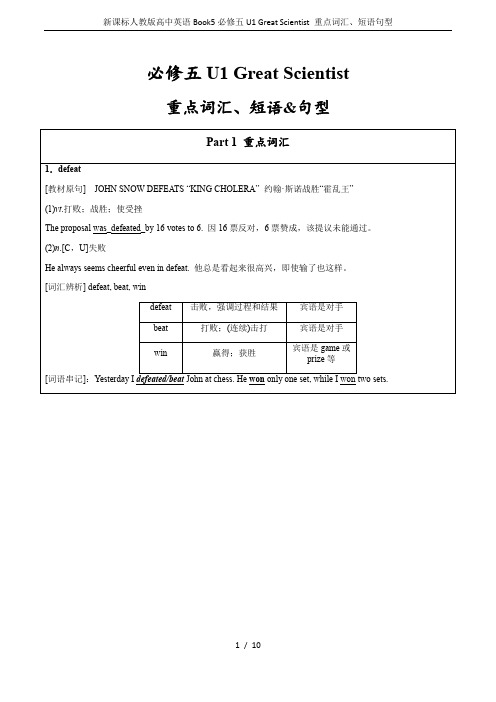
必修五U1 Great Scientist 重点词汇、短语&句型形象记忆[动]construct建造↔[动]destroy破坏[名]construction建造↔[名]destruction破坏形象记忆Many people contributed money to the poor boy, which contributed to his returning to school. A writer wrote a story about this and contributed it to a newspaper.许多人给那个可怜的男孩捐款,使他可以重返校园。
一位作家写了一则关于此事的故事并把它投到一家报社。
形象记忆5. He placed a fixed sun at the centre of the solar system with_the_planets_going_round_it and only the moon still going round the earth.他把固定的太阳放在太阳系的中心,别的行星都围绕太阳转动,只有月亮仍然围绕地球转动。
with the planets going round it 是“with +宾语+宾语补足语”结构,在句中作状语,表示原因、条件、伴随等。
此外,此结构还可作后置定语。
with 复合结构的构成:with +宾语+⎩⎪⎨⎪⎧ adj ./adv ./介词短语宾语和宾补之间是主动关系宾语和宾补之间是被动关系不定式作宾补有“将来”的含义①The little boy ran along the street with nothing on. 这个小男孩沿街跑着,什么也没穿。
②With prices going_up,_we can't afford too many clothes. 随着物价的上涨,我们买不起太多的衣服。
人教版九年级英语Unit1重点词汇和句型(教师版)

Unit11.conversation n.[C]. 交谈;谈话与某人交谈have conversations with sb.区别:communication:沟通,表达;通讯2.aloud adv.大声地;出声地loud adj. & adv.响亮地/ 响亮地loudly adv.响亮地(喧闹)3.pronounce v.发音,读音pronunciation n. [C, U]. 发音;读音4.patient n.[C]. 病人; adj.有耐心的反adj. impatient 没有耐心的patience n.耐心be patient with sb./sth. 对某人/某事有耐心5.expression n [C, U].表情;表示;表达方式express v. 表达,表示6.discover v.发现;发觉discovery n.发现,发现物7.look up (在词典、参考书中或通过电脑)查阅;抬头看look up to 仰慕look at 看......look for 寻找look after 照顾,照料look like 看起来像look through 浏览;快速查看look forward to 期盼,期待look out小心look out of向外看look over 仔细检查8.ability n.能力词根able adj.有能力的反义词:unable/disabled/disabilitybe able to/be unable to do sth. 能够/不能做某事9.create v.创造creation n.创造物creativity n.创造力creator n.创造者creative adj.有创造力的creatively adv.创造性地,有创造力地10.active adj.活跃的,积极的; 主动的拓展:actively adv.活跃地activity n.活动词根:act v. 表演; n. 行为,行动action n.行动actor n.男演员actress n.女演员11.connect v.使连接connection n.联系,关联connect …with… 把…和…连接起来12.knowledge n.知识knowledgeable adj. 知识渊博的13. pay attention to doing14. 用英语交谈have conversations with sb. in English15. 记英语单词memorize English words16. 擅长于be good at/ do well in17. 不擅长be weak in/ be poor in/at/ be bad at18. 在…上有困难have difficulty/ trouble in (doing)19. 养成大声阅读的习惯form the habit of reading aloud20. 在语法方面犯错make mistakes in grammar21. 练习说英语practice speaking English22. 害怕做某事be afraid of doing23. 相信自己believe in oneself24. 取得巨大进步make great progress25. 向某人寻求帮助ask sb. for help26. 小组学习study with a group27. 获得主旨get the main ideas28. 逐字逐句地word by word29. 意群word groups30. 用那种方式学到很多learn a lot that way31. 说的技能speaking skills32. 发现做…是…的find it +adj. + to do sth.33. 肢体语言body language34. 脸上的表情expressions on one’s faces35. 关键词key words36. 小菜一碟。
[精]人教版八年级英语上册Unit2单词、知识梳理、词汇句式精讲
![[精]人教版八年级英语上册Unit2单词、知识梳理、词汇句式精讲](https://img.taocdn.com/s3/m/5b68e15a8bd63186bdebbc48.png)
人教版八年级英语上册Unit2单词、知识梳理、词汇句式精讲一、单词housework ['haʊswɜːk] n.家务劳动hardly ['hɑːdli] adv.几乎不;简直不;刚刚ever ['evə(r)] adv.曾经;在任何时候once [wʌns] adv.一次;曾经twice [twaɪs] adv.两倍;两次Internet ['ɪntənet] n.因特网program ['prəʊɡræm] n.节目;程序;课程;节目单full [fʊl] adj.满的;充满的;完全的swing [swɪŋ] n.摇摆;秋千v.摇摆;旋转maybe ['meɪbi] adv.或许;也许;可能swing dance摇摆舞least [liːst] adj.最小的;最少的at least至少hardly ever很少;几乎从不;难得junk n.垃圾;废旧杂物coffee ['kɒfi] n.咖啡;咖啡色health [helθ] n.健康;人的身体或精神状态result [rɪ'zʌlt] .结果;后果percent [pə'sent] adj.百分之...的online [ˌɒn'laɪn] adj.在线的adv.在线的television ['telɪvɪʒn] n.电视机;电视节目although [ɔːl'ðəʊ] conj.虽然;尽管;然而;可是through [θruː] prep.穿过;凭借;一直到body ['bɒdi] n.身体mind [maɪnd] .头脑;想法;意见;心思such [sʌtʃ] adj.这样的;如此的together [tə'ɡeðə(r)] adv.共同;一起die [daɪ] v.死;枯竭;消失writer ['raɪtə(r)] n.作者;作家dentist ['dentɪst] n.牙科医生magazine ['mæɡəziːn] n.杂志however [haʊ'evə(r)] adv.然而;无论如何;不管多么than [ðən] conj.比almost ['ɔːlməʊst] adv.几乎;差不多none [nʌn] pron.没有人;没有任何东西,毫无less [les] adj.更少的;较少的point [pɔɪnt] n.看法;要点;重点;小数点;目标;分数such as例如;诸如junk food n.垃圾食品;无营养食品more than超过;多于;不仅仅;非常less than不到;少于Claire 克莱尔Sue 苏American Teenager 《美国青少年》Unit2 知识梳理【重点短语】1.Clean-Up Day 清洁日2. an old people’s home 养老院3. help out with sth. 帮助解决困难4. used to 过去常常......5. care for 关心;照顾6. the look of joy 快乐的表情7. at the age of 在......岁时8.clean up 打扫(或清除)干净9. cheer up (使)变得更高兴;振奋10. give out 分发;散发11. come up with 想出;提出12. make a plan 制订计划13. make some notices 做些公告牌14. try out 试用;试行15. work for 为…工作;为…. 效力16. put up 建造;举起;张贴17. hand out 分发;散发;发给18. call up 打电话;召集19. put off 推迟;延迟20. for example 比如;例如21. raise money 筹钱;募捐22. take after 与......相像;像23. give away 赠送;捐赠24. fix up 修理;修补;解决25. be similar to 与……相似26. set up 建立;设立27. disabled people 残疾人28. make a difference 影响;有作用29. be able to 能够30. after-school reading program 课外阅读项目【重点句型】1. The boy could give out food at the food bank.这个男孩可以在食品救济站分发食物。
人教版七年级英语上册unit 3句式讲解及知识梳理
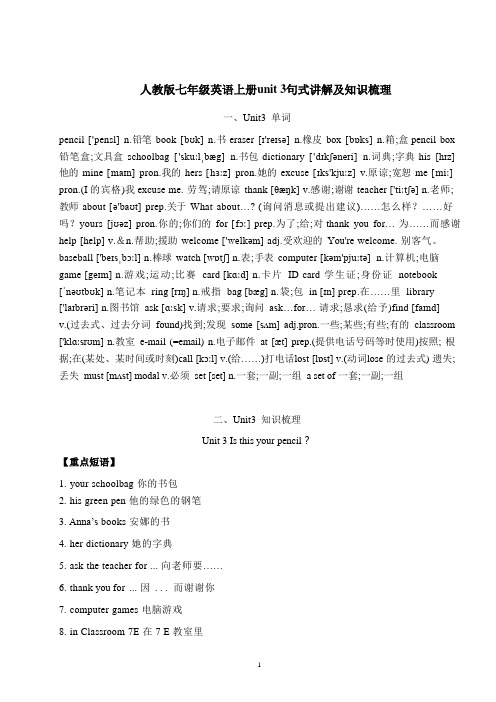
人教版七年级英语上册unit 3句式讲解及知识梳理一、Unit3 单词pencil ['pensl] n.铅笔book [bʊk] n.书eraser [ɪ'reɪsə] n.橡皮box [bɒks] n.箱;盒pencil box 铅笔盒;文具盒schoolbag ['skuːlˌbæg]n.书包dictionary ['dɪkʃəneri]n.词典;字典his [hɪz] 他的mine [maɪn] pron.我的hers [hɜːz] pron.她的excuse [ɪks'kjuːz] v.原谅;宽恕me [miː] pron.(I 的宾格)我excuse me. 劳驾;请原谅thank [θæŋk] v.感谢;谢谢teacher ['tiːtʃə] n.老师; 教师about [ə'baʊt] prep.关于What about…? (询问消息或提出建议)……怎么样?……好吗?yours [jʊəz] pron.你的;你们的for [fɔː] prep.为了;给;对thank you for… 为……而感谢help [help] v.&n.帮助;援助welcome ['welkəm] adj.受欢迎的You're welcome. 别客气。
baseball ['beɪsˌbɔːl] n.棒球watch [wɒtʃ] n.表;手表computer [kəm'pjuːtə] n.计算机;电脑game [geɪm] n.游戏;运动;比赛card [kɑːd] n.卡片ID card 学生证;身份证notebook [ˈnəʊtbʊk] n.笔记本ring [rɪŋ] n.戒指bag [bæg] n. 袋;包in [ɪn] prep.在……里library['laɪbrəri] n.图书馆ask [ɑːsk] v.请求;要求;询问ask…for… 请求;恳求(给予)find [faɪnd]v.(过去式、过去分词found)找到;发现some [sʌm] adj.pron.一些;某些;有些;有的classroom ['klɑːsrʊm] n.教室e-mail (=email) n.电子邮件at [æt] prep.(提供电话号码等时使用)按照; 根据;在(某处、某时间或时刻)call [kɔːl] v.(给……)打电话lost [lɒst] v.(动词lose 的过去式) 遗失;丢失must [mʌst] modal v.必须set [set] n.一套;一副;一组 a set of 一套;一副;一组二、Unit3 知识梳理Unit 3 Is this your pencil?【重点短语】1.your schoolbag 你的书包2.his green pen 他的绿色的钢笔3.Anna’s books 安娜的书4.her dictionary 她的字典5.ask the teacher for ... 向老师要……6.thank you for ... 因 ... 而谢谢你puter games 电脑游戏8.in Classroom 7E 在7 E 教室里9.in the school library 在学校图书馆10.call me 给我打电话11. call me at 495-3539 拨4 9 5 -3 5 3 9 打电话给我12.e-mail me at... 用……给我发电子邮件13.my school ID card 我的学生卡14.a set of keys 一串钥匙15. some keys 一些钥匙【重点句型】1.—What’s this? 这是什么?—It’s a watch. 一块手表。
Unit 5 重点词汇与高频短语及常考句型归纳 2024-2025学年译林版七年级英语上册

Unit 5 A healthy lifestyle重点词汇与高频短语及常考句型归纳单元重点词汇1.health n.健康教材原句:Fish is good for our health.鱼对我们的健康有益。
▶归纳 health意为“健康”,是不可数名词。
常用短语:in good health身体好;in poor health身体不好。
▶拓展Keep healthy by eating well and exercising regularly. 通过良好饮食和经常锻炼保持健康。
They looked poor and unhealthy. 他们看起来贫病交加。
In fact, it is important for everyone to lose weight healthily, but how can you do it? 事实上,健康减肥对每个人来说都很重要,但是你怎么才能做到呢?She didn't eat unhealthily-the rest of the family ate exactly the same meals. 她没有吃不健康的东西-家庭的其余面员都吃同样的饭菜。
▶典例精讲 To students, it is important to have (health) meals every day.答案:healthy 考查形容词的用法。
句意:对学生来说,每天吃健康的食物很重要。
health健康,是名词,空格后meals为名词,此处应用形容词修饰,结合语境可知,空处指的是“健康的”。
2.need vt.需要;n.需要的事物;需要教材原句:I need to get enough sleep. 我需要充足的睡眠。
▶归纳 need作实义动词时,意为“需要”,有人称,时态和数的变化,后接名词或动词不定式作宾语。
We need five more books. 我们还需要5本书。
2019人教版高中英语必修一Unit 3 核心单词知识句型讲解

第11讲Unit 3 Sports and Fitness目标1掌握重点单词和词块的用法。
一、核心单词讲解清单一----词表词汇速记(限时25分钟)1. set an example 树立榜样set an example to/for sb 给某人树立榜样follow one's example 效仿某人;以某人为榜样take...for example 以……为例for example/instance 例如eg. We Chinese people are all called on to learn from Lei Feng, who we think sets an example to us all. 我们中国人都被号召向雷锋学习,我们认为他为我们树立了榜样。
2.honour(又作honor)n.荣誉;尊敬;荣幸● It's an honour for sb to do sth 对某人来说做某事很荣幸feel it an honour to do sth 为做某事感到荣幸in honour of...向……表示敬意;为纪念……● be/feel honoured to do sth 做某事感到荣幸● honourable adj.可敬的;体面的honoured adj.受尊敬的st but not least,I feel it a great honour to represent my class to take part in the group dancing competition.最后但同等重要的是,代表我们班参加团体舞比赛,我感到很荣幸。
3.determination n.决心;决定● with determination 有决心● determine vt.决定;确定;下决心;影响determine to do sth 决定做某事determine on/upon(doing)sth 决定(做)某事● determined adj.有决心的be determined to do sth 决心做某事(表示状态)【联想】“决定做某事”表达还有∶①decide to do sth ②make a decision to do sth③make up one's mind to do sth4.injure vt.使受伤;损害(hurt)● injured adj.受伤的;有伤的get injured 受伤the injured 伤员● injury n.伤害;损伤do an injury to sb 伤害某人5. lose heart 丧失信心;泄气lose one's heart to 某人倾心于……;爱上……put one's heart into 某人专心于……heart and soul全心全意;完全地learn...by heart 记忆;背诵eg. In no sense should you lose heart; keep trying and you will make it sooner or later. 决不应丧失信心;继续努力,你迟早会成功的。
知识梳理 人教版英语八下Unit3知识梳理、词汇句式精讲

知识梳理 | 人教版英语八下Unit3知识梳理、词汇句式精讲Unit3 知识梳理【重点短语】1.go out for dinner 出去吃饭2.stay out late 在外面待到很晚3.go to the movies 去看电影4.get a ride 搭车5.work on 从事6.finish doing sth. 完成做某事7.clean and tidy 干净整洁的8.do the dishes 洗餐具9.take out the rubbish 倒垃圾10.fold your/the clothes 叠衣服11.sweep the floor 扫地12.make your/the bed 整理床铺13.clean the livng room 打扫客厅14.no problem 没问题15.welcome sb. 欢迎某人e home from school/work放学/下班回家17.throw down 扔下18.sit down 坐下e over 过来20.take sb. for a walk 带某人去散步21.all the time 一直;总是22.all day/evening 整曰/夜23.do housework 做家务24.shout back 大声回应25.walk away 走开26.share the housework 分担家务27.a comfortable home 一个舒适的家28.in surprise 惊讶地29.get something to drink 拿点喝的东西30.watch one show 观看一个节目31.hang out 闲逛32.pass sb. sth. 把某物传给某人33.lend sb. sth. 把某物借给某人34.get sth. wet 使某物弄湿35. hate to do sth. 讨厌做某事36.do chores 做杂务37.help sb. (to ) d o /with sth•帮助某人干某事38.bring a tent带顶帐篷来39.buy some snacks买些小吃40.go to the store去商店41.invite sb. to a party邀请某人参加聚会42.make sb. do sth. 使某人做某事43.enough stress足够的压力44.a waste of time浪费时间45.in order to为了46.get good grades取得好成绩47.mind doing sth. 介意做某事48.depend on依赖;依靠49.develop children's independence发展孩子的独立性50.look after/take care of 照顾;照看51.do one's part in (doing ) sth. 做某人分内的事【重点句型】1.Could you please clean your room? 你能打扫一下你的房间吗?2. I have to do some work. 我必须干些活。
八年级英语下册Unit1 知识梳理(重要句型、重点单词、短语解析及练习)

八年级英语下册Unit1 知识梳理(重要句型、重点单词、短语解析及练习)课文翻译:Section A 会话Role-play the conversation. 角色扮演对话。
Lisa, are you OK? 丽莎,你还好吗?I have a headache and I can't move my neck. 我头痛,我的脖子不能动了。
What should I do? 我头痛,我的脖子不能动了。
Should I take my temperature? 我应该测测体温吗?No, it doesn't sound like you have a fever. 不,你看起来不像是发烧了。
What did you do on the weekend? 你周末做什么了?I played computer games all weekend. 我整个周末都在玩电脑游戏。
That's probably why. 这可能就是你头痛的原因了。
You need to take breaks away from the computer. 你需要休息并且远离电脑。
Yeah, I think I sat in the same way for too long without moving. 是的,我想我是因为以同样的姿势坐的太久没有动。
I think you should lie down and rest. 我想你应该躺下休息。
If your head and neck still hurt tomorrow, then go to a doctor. 如果明天你的头部和颈部还疼,再去看医生。
OK. Thanks, Mandy. 好。
谢谢你,曼蒂。
Section A 短文Read the passage. 阅读下面的短文。
Do you think it comes from a newspaper or a book? 你认为这篇短文是出自一份报纸还是一本书?How do you know? 你是怎么知道的?Bus Driver and Passengers Save an Old Man 公交车司机和乘客救了一位老人At 9:00 a.m. yesterday, bus No. 26 was going along Zhonghua Road when the driver saw an old man lying on the side of the road. 在昨天上午9点,当司机看到一位老人躺在路边,26路公交车正在沿中华路行驶。
- 1、下载文档前请自行甄别文档内容的完整性,平台不提供额外的编辑、内容补充、找答案等附加服务。
- 2、"仅部分预览"的文档,不可在线预览部分如存在完整性等问题,可反馈申请退款(可完整预览的文档不适用该条件!)。
- 3、如文档侵犯您的权益,请联系客服反馈,我们会尽快为您处理(人工客服工作时间:9:00-18:30)。
中学英语重点词汇和句型用法讲解(上)中学英语重点词汇和句型用法1. 提建议的句子:①What/ how about +doing sth.? 如:What/ How about going shopping?②Why don’t you + do sth.? 如:Why don’t you go shopping?③Why not + do sth. ?如:Why not go shopping?④Let’s + do sth. 如:Let’s go shopping⑤Shall we/ I + do sth.?如:Shall we/ I go shopping?2. first of all首先to begin with一开始later on后来、随3. also也而且(用于肯定句)常在句子的中间either也(用于否定句)常在句末too也 (用于肯定句) 常在句末4. see sb. / sth. doing看见某人正在做某事强调正在发生see sb. / sth. do看见某人做了或经常做某事如:如: She saw him drawing a picture in the classroom.她看见他正在教室里画画。
5. too many 许多修饰可数名词如:too many girlstoo much 许多修饰不可数名词如:too much milkmuch too 太修饰形容词如:much too beautiful6. used to do sth.过去常常做某事否定形式:didn’t use to do sth.used not to do sth.如:He used to play football after school. 放学后他过去常常踢足球。
Did he use to play football? Yes, I did. No, I didn’t.He didn’t use to smoke. 他过去不吸烟。
7. 反意疑问句①肯定陈述句+否定提问如:Lily is a student, isn’t she?Li ly will go to China, won’t she?②否定陈述句+肯定提问如:She doesn’t come from China, does she?Yo u haven’t finished homework, have you?③提问部分用代词而不用名词如: Lily is a student, isn’t she?④陈述句中含有否定意义的词如:little, few, never, nothing, hardly 等。
其反意疑问句用肯定式如:He knows little English, does he? 他一点也不懂英语,不是吗?They hardly understood it, did they?他们几乎不明白,不是吗?8.be interested in sth.对…感兴趣take an interest inbe interested in doing sth.对做…感兴趣如:He is interested in math, but he isn’t interested in speaking English.他对数学感兴趣,但是他对说英语不感兴趣。
9. interest ed adj. 感兴趣的,指人对某事物感兴趣,往往主语是人interest ing adj.有趣的,指某事物/某人具有趣味,主语往往是物10. in the last few years. 在过去的几年内常与完成时连用如:I have lived in China in the last few years. 在过去的几年内我在中国住。
11. how to swim 怎样游泳不定式与疑问词连用:动词不定式可以和what, which, how, where, when 等引导的疑问句连用,构成不定工短语。
如:The question is when to start. 问题是什么时候开始。
I d on’t know where to go. 我不知道去哪。
I don`t know what to do next.. 我不知道下一步做什么。
12. make sb./ sth. +形容词make you happymake sb./ sth. +动词原形 make him laugh13. it seems that +从句It seems + adj……It seem + to be看起来好像……如:It seems that he has changed a lot. 看起来他好像变了许多。
14. 看起来好像…sb. seem to do sth. He seems to feel very sad.it seems that +从句.It seems that he feels very sad. 他看起来好像很伤心。
系动词不能独立作谓语,要和表语一起构成谓语。
常用的连系动词有:look, feel, be, become, get, turn, smell, taste, stay(保持), kept等。
连系动词除be和become等少数词可接名词作表语外,一般都是接形容词。
如:They are very happy. He became a doctor two yearsago. She felt very tired.15.help sb. with sth.帮某人某事help sb. (to ) do sth.帮某人做某事help sb out帮某人摆脱困难help do sth 帮助做某事help with sth.如:They help with this problem.She helped me with English. 她帮助我学英语。
She helped me (to) study English。
她帮助我学习英语。
They help you relax. 他们帮助你放松16. fifteen-year-old作形容词15岁的fifteen-year-olds作名词指15岁的人fifteen years old指年龄15岁如:a fifteen-year-old boy 一个15岁的男孩Fifteen-year-olds like to sing. 15岁的人喜欢唱歌。
I am fifteen years old . 我是15岁。
17.不再①no more == no longer如: I play tennis no more/ longer.我不再打网球。
②not …any more == not …any longer如:18.语态:①英语有两种语态:主动语态和补动语态主动语态表示是动作的执行者被动语态表示主语是动作的承受者Cats eat fish. (主动语态)猫吃鱼。
Fish is eaten by cats. (被动语态) 鱼被猫吃。
②被动语态的构成由“助动词be+及物动词的过去分词”构成助动词be 有人称、数和时态的变化,其变化规则与be 作为连系动词时完全一样。
③被动语态的用法当我们不知道谁是动作的执行者,或者没有必要指出谁是动作的执行者,或者只需强调动作的承受者时,要用被动语态。
19. allow sb. to do sth. 允许某人做某事(主动语态)如:Mother allows me to watch TV every night. 妈妈允许我每晚看电视。
be allowed to do sth.被允许做某事(被动语态)如:LiLy is allowed to go to Qinzhou. 莉莉被允许去钦州。
Sb. allow doing sth.某人允许做某事20. get their ears pierced穿耳洞让/使(别人)做某事get sth. done(过去分词) have sth. done如:I get my car repaired. == I have my car repaired. 我让别人修好我的车21. enough 足够形容词+enough如:beautiful enough 足够漂亮enough+名词如:enough food 足够食物enough to足够…去做…如:I have enough money to go to Beijing. 我有足够的钱去北京。
She is old enough to go to school.她够大去读书了。
22.倒装句:So+助动词(be/do/will/have)/情态动词+主语意为:…也是一样So +主语+be/助动词/情态动词是呀,表示赞同别人的观点(陈述语序)Neither + be /助动词/情态动词+主语…也不一样(用于否定句)如:He has been to Beijing. So have I.It’s a fine day. So it is.She doesn’t like eggs. Neither do I.She is a student. So am I. 她是一个学生,我也是。
She went to school just now. So did I . 她刚才去学校了,我也是She has finished the work. So have I . 她已经完成了工作,我也完成了。
She will go to school. So will he. 她将去学校,他也是。
23.take the test参加考试pass the test通过考试fail a test 考试失败24. have an opportunity to do sth.有机会做某事have a chance of doing sth.有机会做某事如:I have an opportunity to go to Beijing.I have a chance of going to Beijing.25. at least最少 at most最多26. 花费take ,cost, spend , paysth. take (sb.) time to do sth. It took (me) 10days to read the book.sth.cost (sb.) ……The book cost (me) 100yuan.sb.spend … on sth. She spent 10days on this book.sb.spend …doing sth. She spent 10days reading this book.sb.pay … for sth. She paid 10yuan for this book.27. have +时间段+off 放假,休息如:have 2 days off28. reply to 答复某人如:She replayed to MrGreen.29. agree with sth.同意某事如:I agree with that idea.agree to sb. 同意某人的意见如:I agree to LiLei.30. get in the way of碍事,妨碍如:Her social life got in the way of her studies. 她的社会生活妨碍了她的学习。
